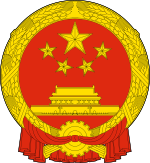State Environmental Protection Administration
|
中华人民共和国环境保护部 Zhōnghuá Rénmín Gònghéguó Huánjìng Bǎohùbù |
|

|
|
| Agency overview | |
|---|---|
| Formed | March, 2008 |
| Preceding agency |
|
| Jurisdiction |
|
| Headquarters | Beijing |
| Minister responsible | |
| Parent agency | State Council |
| Website | english |
The Ministry of Environmental Protection of the People's Republic of China (MEP), formerly State Environmental Protection Administration (SEPA), is a cabinet-level ministry in the executive branch of the Government of China. It replaced the SEPA during the March 2008 National People's Congress sessions in Beijing.
The Ministry is the nation's environmental protection department charged with the task of protecting China's air, water, and land from pollution and contamination. Directly under the State Council, it is empowered and required by law to implement environmental policies and enforce environmental laws and regulations. Complementing its regulatory role, it funds and organizes research and development. In addition, it also serves as China's nuclear safety agency.
In 1972, Chinese representatives attended the First United Nations Conference on the Human Environment, held in Sweden. The next year, 1973, saw the establishment of the Environmental Protection Leadership Group. In 1983, the Chinese government announced that environmental protection would become a state policy. In 1998, China went through a disastrous year of serious flooding, and the Chinese government upgraded the Leading Group to a ministry-level agency, which then became the State Environmental Protection Administration.
There are 12 offices and departments under MEP, all at the si (司) level in the government ranking system. They carry out regulatory tasks in different areas and make sure that the agency is functioning accordingly:
Minister Xie Zhenhua resigned in December 2005 amidst an industrial pollution scandal by PetroChina, a Chinese national oil company, on the Songhua River in the northeastern province Heilongjiang; local environmental protection officials were accused of protectionism, while senior officials at SEPA were blamed for their underestimating and ignoring the matter.
...
Wikipedia
